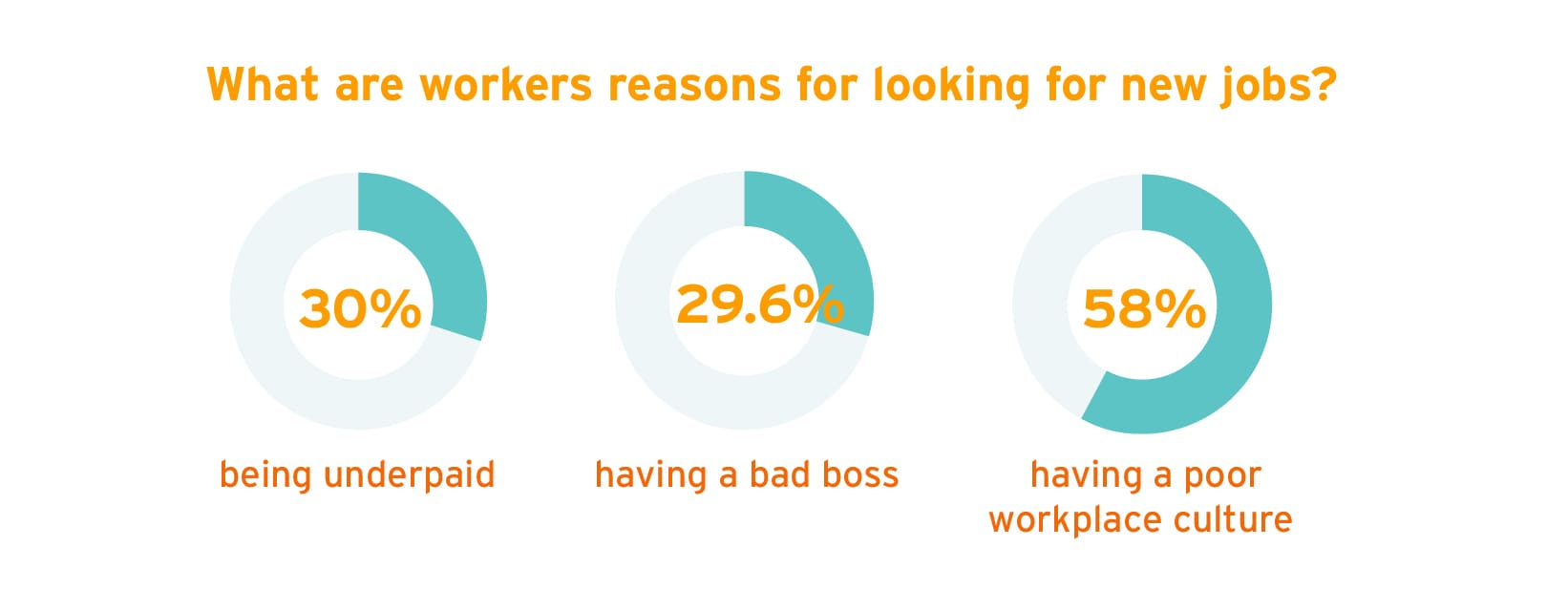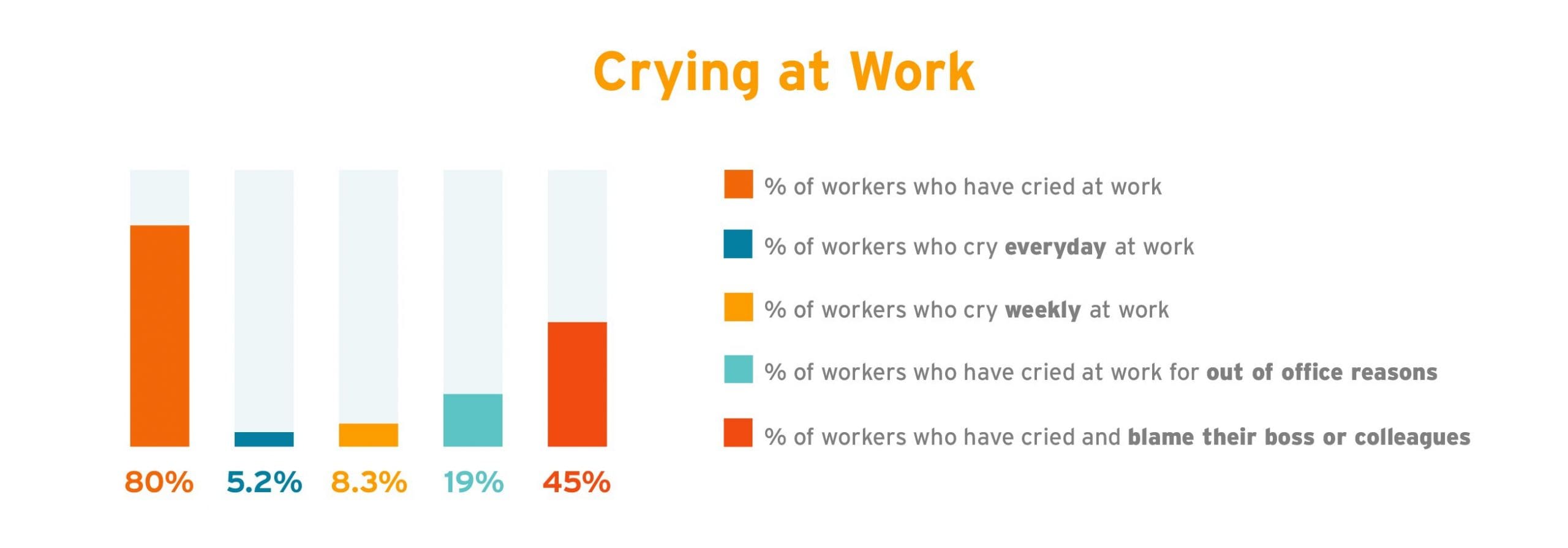The HR News Wire: Everyone Seems Like They Want to Quit Their Jobs. Here’s a Round-Up
December 20, 2019 by Josh Hrala
The HR News Wire is a weekly column that explores breaking HR news and research. This week, we’re taking a bit of a different approach by looking at some past stories and one new one about employees saying that they’d quit their current roles for the exact same job elsewhere (mainly because of their bosses).
Over the last few weeks, the HR news wire has been completely stuffed with reasons why employees – despite HR and organizational moves to retain them – want to quit their current roles.
So, in order to keep track of all of this, I decided that it makes sense to attempt (and it’s a big attempt) to put all of these pieces together and paint a larger picture.
What Are We Covering Today?
Here’s the core message of it all: employee engagement is a hot topic right now. There are literally thousands upon thousands of articles about how to retain and engage staff members because retention is the name of the game in 2019. This mainly has to do with the strength of the economy, which has empowered workers to find new roles and has created an extremely tight labor market.
The question, therefore, is this: with all of this employee engagement talk, is anything actually working? Because based on the current news, it seems like if you were to add all of the recent studies together, you’d come to the conclusion that the vast majority of US workers are ready at a moment’s notice to jump ship.
To help illustrate this, we’re going to look at a few of our past stories to paint a broader picture. If you’ve been following this series, feel free to skip to the new study (or read about them again!).
Everyone Seems Like They’re on the Verge of Quitting: A Study Round-Up
A few weeks ago, we reported on a some research that explained just how close most US workers are to leaving their current roles.
In that article, the data suggested that 88 percent of workers are just one decent opportunity away from moving on. Here’s some of those details:
According to Valerie Bolden-Barrett from HR Dive, pay was one of the biggest reasons for this. The study found that 61 percent of participants claimed that a nine percent pay increase would be enough for them to take up a new role. They also found that being underpaid was a big reason, too, with 30 percent of participants saying that it would cause them to look for a new job.
From there, the study went on to discuss culture, which is always a top reason for people to leave or stay at a company.
“Results also indicate that having a bad boss is nearly as bad as a non-competitive salary, with 29.6% of respondents saying a bad manager or boss would most likely cause them to try to find a new job,” the team said.
“Gen Z and millennials were more likely to pick being underpaid than having a bad manager, while Gen X and baby boomers were more likely to select a bad boss over being underpaid.”
This study backed up a more recent SHRM study that found that toxic work environments have costed US companies a combined $223 billion over the last five years. 58 percent of those studied say that poor workplace culture was the prime reason with most saying that these issue have come directly from their managers.
Again, this study was backed up by yet another (this is going to be a trend here), which found that 96 percent of managers believe their teams suffer or are on the verge of suffering from burnout.
While it’s nice to know that managers recognize this in their staff, the real takeaway was that managers and employees do not agree fundamentally on the reason for burnout.
“Workers and managers alike seem to agree burnout is an issue, but they don’t see eye to eye on the main reason,” reports the team.
“When given a list of factors that may be contributing to employee burnout, workers ranked constant interruptions first, while senior managers believed unmanageable workloads were the biggest issue for their teams.”
Without being on the same page, managers fail to fix the root cause of the issue, leading – possibly – to them continually interrupting their staff members, which causes them to not get their work done in a timely manner, which then increases their workload, which then causes them to burnout.
Burnout is a major issue in today’s ‘always on’ work culture. According to one study about physicians back in May, burnout has costs just the healthcare industry alone a whopping $6.3 billion per year. $4.6 billion of that costs came from turnover.
Given that that study only looked at healthcare, it’s safe to assume that the general economy at large suffers an even bigger hit. This staggering number combined just with the SHRM findings show that workplace cultural issues need to change if organizations want to keep retention rates high.
Everyone’s Crying
While on the topic of culture, one of the hardest hitting studies we covered lately found that 80 percent of workers have cried at work.
The team polled 3,078 people. Out of those individuals, 5.2 percent said that they cry every day at work, 8.3 percent reported that they cry weekly at work, and the majority (49.7 percent) said that they do cry at work, but only a few times ever. According to CNN, only 19 percent of these respondents said that the tears flowed because of personal, out of office things.
That last line is the most telling. A lot, and we mean a lot, of people are crying at work over work-related issues. And, just like with the toxic culture study SHRM just put out, 45 percent of respondents blame their crying on their boss or manager.
“More than 45 percent of respondents who said they cry at work blamed bosses or colleagues, Monster found,” reports Aimee Pichhi from CBS News.
“Personal issues were a distant second, with about 19 percent of workplace weepers blaming problems at home or in their non-workplace lives for following them through the office door.”
This study highlights just how bad some cultures are. If nearly everyone has cried at work because of work-related things, something needs to give.
What’s Going on With Managers?
So far, we’ve found that most workers are burned out and most managers don’t fully understand the reason why. We’re found that most workers are one decent offer away from leaving their current position (pay was a major factor here but managers were also blamed – 54.2 percent of those asked said so). We’ve also found that most people have cried at work and some even cry at work every day. The main reason cited here is management.
This begs the question: what is wrong with managers?
This question is backed up by the SHRM study, which – again – found that poor culture is directly related to management and that those cultures have cost the US nearly a quarter of a trillion dollars.
Another study also found that managers who only obsess over the bottom line actually cause their workers to stop doing tasks and eventually quit.
“Supervisors who focus only on profits to the exclusion of caring about other important outcomes, such as employee well-being or environmental or ethical concerns, turn out to be detrimental to employees,” said lead researcher Matthew Quade, from Baylor University’s Hankamer School of Business.
“This results in relationships that are marked by distrust, dissatisfaction and lack of affection for the supervisor. And ultimately, that leads to employees who are less likely to complete tasks at a high level and less likely to go above and beyond the call of duty.”
Is this is the real issue that’s happening here? Are managers too concerned with the bottom line and not concerned nearly enough with their staff members’ well being?
Maybe.
Even with all of this data, it’s hard to figure out why managers – people who have worked up the corporate chain and have been chosen to lead – cannot seemingly grasp the fact that they are hurting – not helping – the bottom line, the economy at large, and most importantly their staff members.
This leads a bit of credit to the age-old saying that people quit their managers and not their organizations. While that does seem true, it would be foolish to say that managers are not a product of the organization at large, meaning that organizations need to be held accountable for their poor managers. That popular saying seems like it might be a way to pass the buck onto lower tiered managers instead of recognizing an institutional problem that’s causing tons of disengagement, unhappiness, and even tears.
Wrapping Up
All of these studies are extremely telling about the current state of work in the US. While the economy is thriving, many top thought leaders in the HR space have chosen to focus on engagement. However, if these studies are anything to go by, an audit of managers may be the right pathway forward before the topic of employee engagement can even be breached.
If managers are not performing their roles well, a whole slew of issues can pop up.
Even though workers are empowered right now to find new roles easier than they would be if the economy was worse, these toxic cultures will still pose a threat to talent management, employees lives, and much more.
While most retention topics right now focus solely on trying to make workplaces more attractive to potential hires and how employers can increase employee engagement, the research suggests that management issues need addressed before any of that matters.
More from Careerminds
In need of outplacement assistance?
At Careerminds, we care about people first. That’s why we offer personalized talent management solutions for every level at lower costs, globally.





